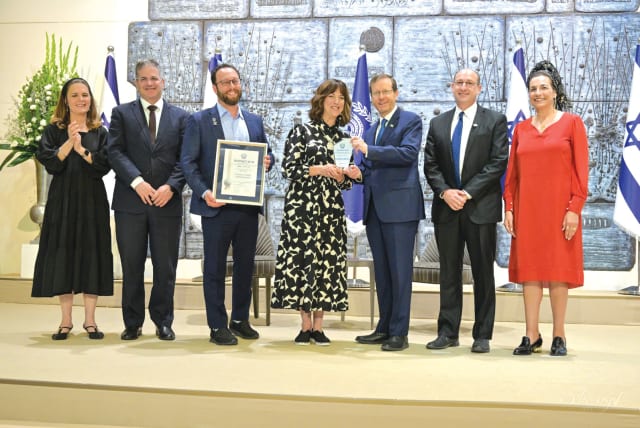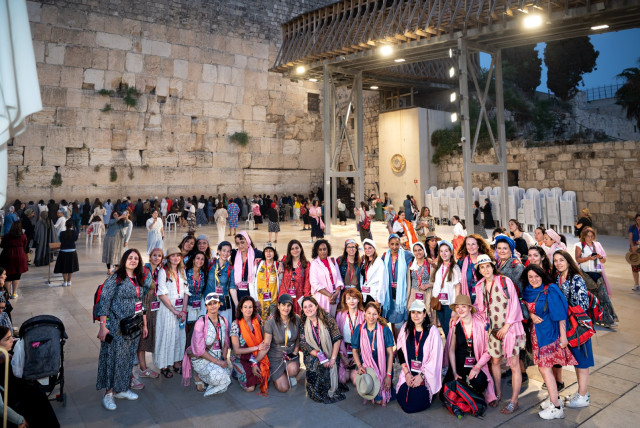The Jewish people are a family, albeit a dysfunctional one - opinion

The MOMentum organization believes in focusing on Jewish unity, despite the things that seem to divide us.
In the summer of 2014, the State of Israel and the entire Jewish people hoped and prayed that three kidnapped teens would be found and returned safely to their homes. For 18 days, all political strife was put aside because the life of those precious boys was far more important than whatever differences we may have had.
When the news broke that Eyal Yifrach, Gilad Shaer, and Naftali Fraenkel had been brutally murdered, our collective hope was taken away, but our unity remained, in mourning for their souls.
I heard the news on the very first night of one of our MOMentum Year-Long Journey trips, which bring Jewish women (and sometimes their husbands) on an immersive eight-day mission to Israel. Our first nights are usually marked with a festive celebration where women from all over the world join hands and dance the night away.
Instead of dancing, we swayed together in unison and cried and grieved for the lives of those boys, who had gone far too soon. And instead of a night of joy, some of us paid a shiva call to Rachelle Fraenkel, the grieving mother of Naftali. The women on the trip wrote hand-written notes – each of them, words from mothers expressing their condolences to a fellow mother experiencing the greatest tragedy a parent could go through.
Our words moved her and MOMentum forged a meaningful relationship with her that has lasted ever since. That experience of going through the roller-coaster of emotions with a diverse array of women – relying on each other’s strength to remain resilient throughout the journey – resulted in our global women’s movement adding a fourth goal to our mission: unity without uniformity.
Overcoming divisions to unite Jewish women
Those 18 days in the summer of 2014 taught us that we could all be different, but still very much unified, in the face of adversity.
This is why it’s especially gratifying for MOMentum to receive this year’s Jerusalem Unity Prize in Memory of Eyal, Gil-ad, and Naftali – a joint initiative between the Mayor of Jerusalem Nir Barkat and the Ifrach, Shaer, and Fraenkel families. This prize, born out of their dedication to honoring organizations that hope to replicate the sense of unity the nation experienced during those hopeful, unified days is something that deeply resonates with me and MOMentum as a whole.
At MOMentum, we put our differences aside and focus on what unites us – our shared values, goals, and hopes. It’s an experience that elevates our interpersonal relationships to the next level. Historically, there is no lesson more important for keeping the Jewish people together than unity without uniformity. After all, we all hail from different tribes but we are all rallied around Eretz Israel and its people.
The Talmud itself is dedicated to analyzing everything we agree on. There are general things most Jews agree on, but this treasured text dissects the 2% where we disagree.
Today, when thousands of Israelis take to the streets due to the judicial overhaul proposals, each person – no matter where he or she stands on the issue – is fervently clutching the same Israeli flag as they march. We love the same thing. We care about the same thing. We only differ on the best way to preserve it. That is unity without uniformity.
It is beyond painful that it took the death of three teen boys to unite the Jewish world for those 18 days, but we’re often most united when there’s an existential threat. Even within families, it is not unusual to see members who haven’t spoken in years finally seeing each other face-to-face at the funeral of a parent. What we hope to teach the women who come on the MOMentum Year-Long Journey is that there is no need to wait for tragedy to unite with those close to you. The time to heal, learn, and lean into our heritage is now.
At MOMentum, where we gather women of different cultures, languages, and economic backgrounds, we understand that triggering things can often be said. Yet, our rule of pushing politics aside certainly helps so much that we can see, within 24 hours, women from Los Angeles, Tel Aviv, and Mumbai who were strangers, become sisters.
We also bring that philosophy to the leadership level, where we have successfully worked with 300 partner organizations around the world who typically don’t work together, often seeing each other as competitors. We are able to unite them in joining our journey by conveying the message that, “They’re not your competition, they’re your partner, they just don’t know it yet.”
I’m also a realist. It isn’t every day that we can recapture that exact sense of fraternity we experienced during those 18 days in the summer of 2014, but setting aside a time each year to honor the boys is a crucial exercise in remembering the power of being united.
As Jews, we are not a religion – because even the least observant Jew is as Jewish as the most observant. We’re not a nation – because you don’t need to live in Israel to be Jewish. We’re a people. We’re a family, albeit sometimes a highly dysfunctional one.
Having lived in the Washington DC area and now living in Israel, I often get asked where I fall on the political spectrum. I tell people I’m not “left” nor “right,” I’m “up.” I refuse to be labeled because labels disable. Rather, I advocate for ahava b’kavana (“loving with purpose”). To strive to see, even with people’s mistakes, what there is to love about them.
In this current climate of discord, that’s what we need the most.
The writer is the founding director of MOMentum.
Jerusalem Post Store
`; document.getElementById("linkPremium").innerHTML = cont; var divWithLink = document.getElementById("premium-link"); if (divWithLink !== null && divWithLink !== 'undefined') { divWithLink.style.border = "solid 1px #cb0f3e"; divWithLink.style.textAlign = "center"; divWithLink.style.marginBottom = "15px"; divWithLink.style.marginTop = "15px"; divWithLink.style.width = "100%"; divWithLink.style.backgroundColor = "#122952"; divWithLink.style.color = "#ffffff"; divWithLink.style.lineHeight = "1.5"; } } (function (v, i) { });

